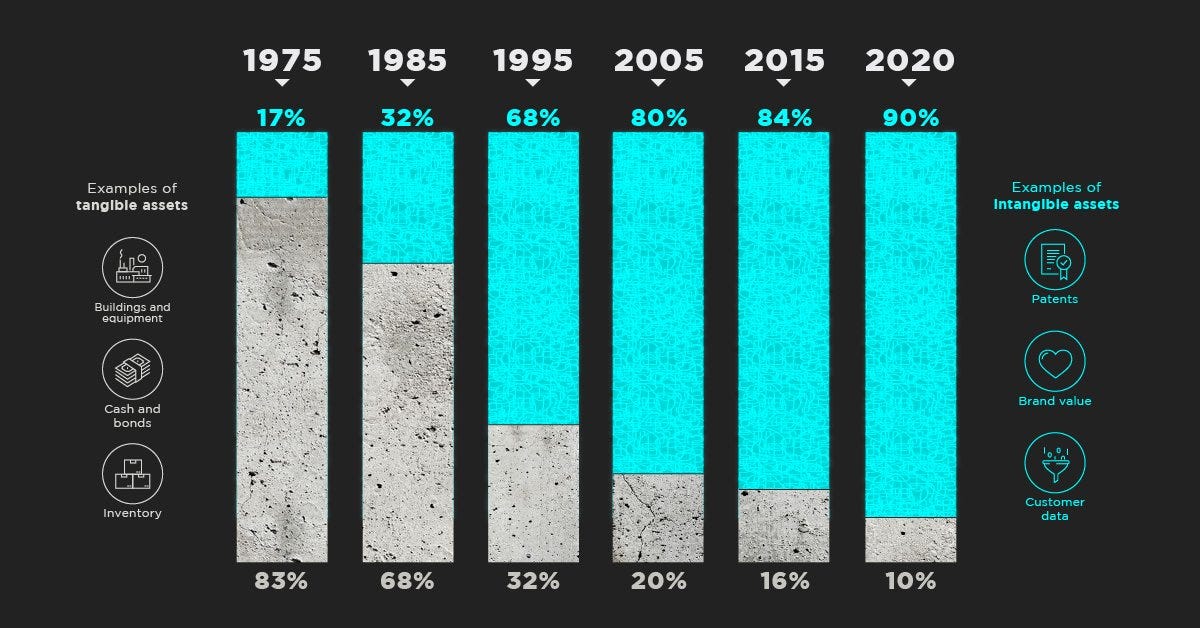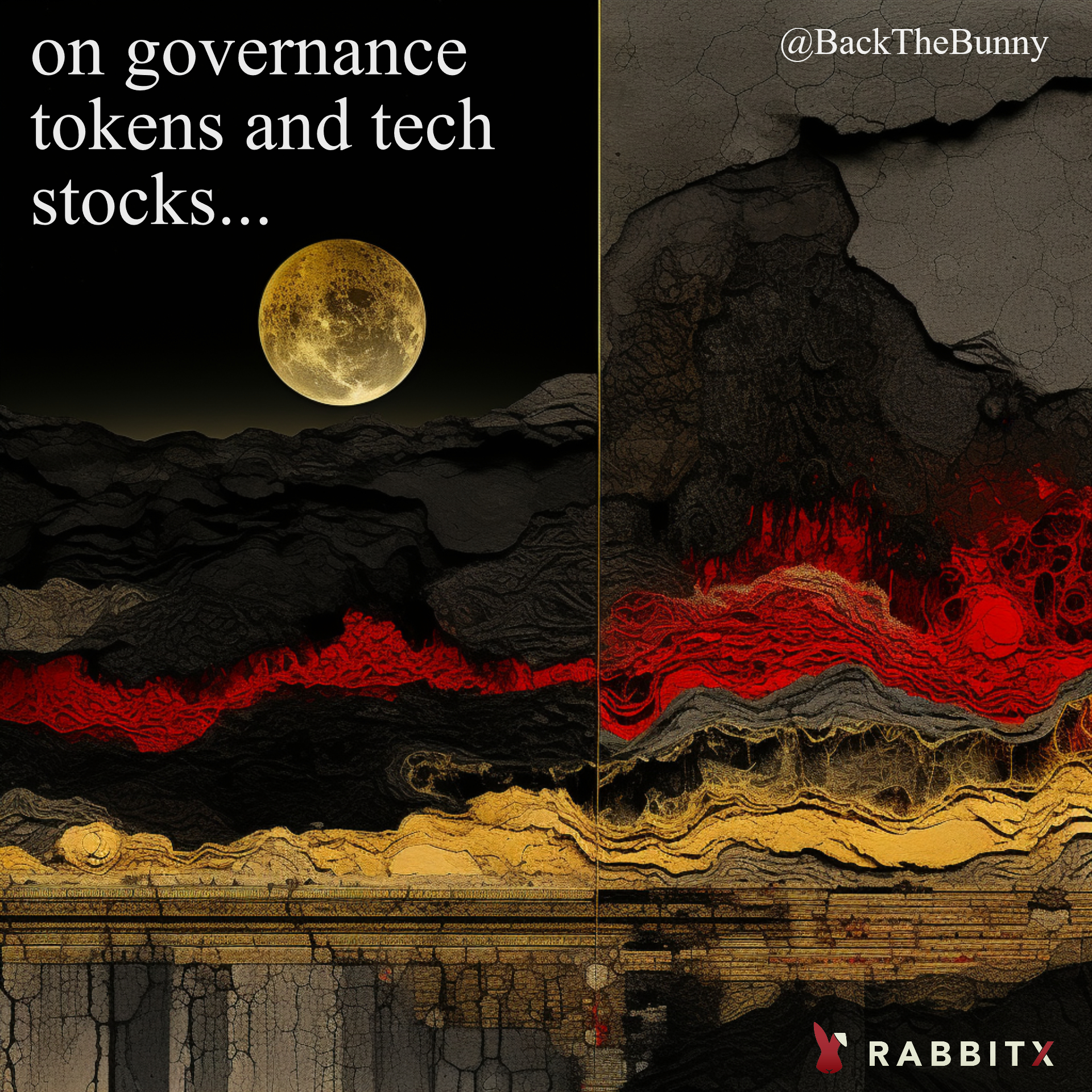Governance tokens… perhaps not as “valueless” as we think.
Uniswap recently had news regarding its long-awaited fee switch, which would allow holders of the UNI token to receive fees from the exchange: tantamount to a dividend. Is this necessary for the token to “accrue value”? What do we even mean when we say that? Surely there is some precedent we can look to.
When you break down all the platitudes and get to brass tax, you’re being hypocritical if you smear UNI as just a governance token but would own Nvidia, Google, TSLA, Cloudflare, or any tech stock with no dividend. What do you think you own exactly? What does your “equity” mean here?
I’ve taken and passed CFA tests, I know the official theory; what I’m interested in is concrete reality, what do you actually get at the end of the day with this asset. Because it isn't a claim on cashflows or company assets. So what is this “equity” you speak of?
About 75% of stocks pay a dividend. And the most richly valued ones (eg tech stocks) often don't. I believe about 50% of NASDAQ stocks don't pay dividends. No cash will be returned to you from many stocks. So why own them? Where is their “fee switch” coming from? Because that’s how something accrues value right? It pays out yield from the earnings? Well, tech stocks do not do that. And yet, they’re very valuable.
It must be the equity claim on company assets then...?
Meh, not really! Especially if they're tech companies. Most tech company assets are intangibles. They're IP, and goodwill, the spoils from research and development. They're the brand and service they've built up via investing through the income statement, not the balance sheet. Here’s an infographic on how the amount of tangible assets on US company balance sheets has been declining over time. It's broken down in 10-year chunks so you can track the changes. As you can see, it's mostly intangibles now.

This means there's no factory for you to lay claim to in bankruptcy. No hard assets to be sold off. You have no “equity” in anything concrete here. The investments these tech companies make are often in the things that seem periphery like customer support and advertising, but are critical capital assets of the tech world.
These squishy tech capital assets are very valuable... to the company. But they have zero book value in a liquidation. What are you doing to do, receive a share of MongoDB's advertising investment or goodwill if they go bankrupt? Book value (the kind you'd care about in bankruptcy) is typically composed of hard assets with market value that can be sold off. But god help you if you ever need to exercise that claim; that means bankruptcy happened and the share price was decimated.
Common stock is a junior claim on assets if the company fails. You get the leftovers after bond holders and preferred shareholders are repaid. And you sure as hell aren't investing in a tech company, or any company, hoping you get the most scraps in bankruptcy. To be clear: you never want to exercise that claim on company assets, that means things went very wrong and you lost a lot of money (barring you’re not a hedge fund who specializes in litigation arbitrage or something).
So what are you getting when you buy NET?
- no cashflows
- nothing in bankruptcy
- voting rights!
You get to vote in shareholder meetings. Neat! Wait, what's a governance token again?
No cash is returned to you when you own tech stocks. You buy them because the financial laws of physics dictate the valuation of equities follows some DCF iron rule that says they go up in price as revenues, cashflows, margins, etc. increases. You will never touch that revenue though. You will never exercise any claim on the company’s assets. What, exactly, is your “equity” giving you equity in?
If that tech company fails, the stock is a zero. And there are no assets to be sold off to make you whole. In essence, you own a governance token with no cashflows, and by the grace of god its valuation is tied to company performance. How is UNI materially different here? Again, no theory here, praxis.
I’ve heard some respond that legal protections make tech stocks safer, and from a “rugging you” standpoint, that’s true. However this is a value accrual analysis, not a legal protections one. Why does the treasury of Cloudflare make NET more valuable when you will never touch one penny of it? Ok so the CEO can’t just steal the corporate bank account because of laws, yes. But that does not say one thing for how you will never get anything valuable out of owning NET.
ON SHARE BUYBACKS
Some important points on share buybacks vs dividends: they're technically the same thing if you're taking a CFA test. I understand the accounting logic and the tax advantaged approach. But it doesn't change the central point being made here.
You're still not getting any income stream with buybacks, and you still have no functional claim on company assets. How do you acquire actual dollars out of your investment? You have to sell those shares to get anything. You receive absolutely nothing by virtue of owning them still besides… voting rights. But there are less of them now!
This artificial-scarcity act pleases the DCF gods that say your stock price should go up now by virtue of there being less of them. But you still have a governance token. A share that only lets you vote on things, has no profits returned to you, and has no real claim on any resources.
Imagine if Uniswap did a UNI buyback….
Maybe your DCF says they should be valued higher now. Why?
>*shows me a Uniswap DCF*
>Ok. And owning these gives you what, exactly?
You can still just vote with them and hope number goes up as the company does well. And as the company grows and its margins improve, that’s what happens; empirically, this is the case whether or not cash is ever returned to you. So why the obsession with the fee switch?
I'm not smearing or advocating governance tokens or tech stocks. I own them too (long NET, in fact). I'm saying be aware of what you own, and don't be hypocritical.
Please share if you found useful. It’s a candid dissection that more people in DeFi should understand.
Footnote: I’m aware NVDA pays a 0.038% dividend last I checked. Which is completely useless. As a shareholder I'd rather the money be in Jensen's hands than mine, where it's far more valuable; he’s obviously a better capital allocator than you or I. Nobody owns Nvidia for the dividend.
Follow BackTheBunny


